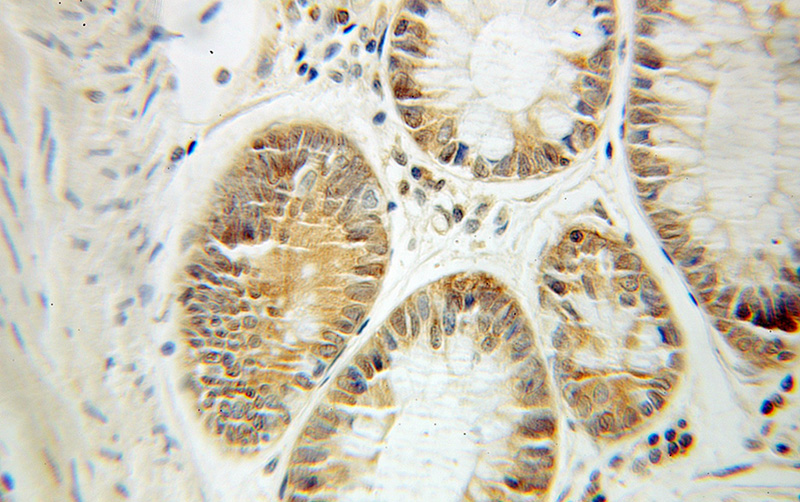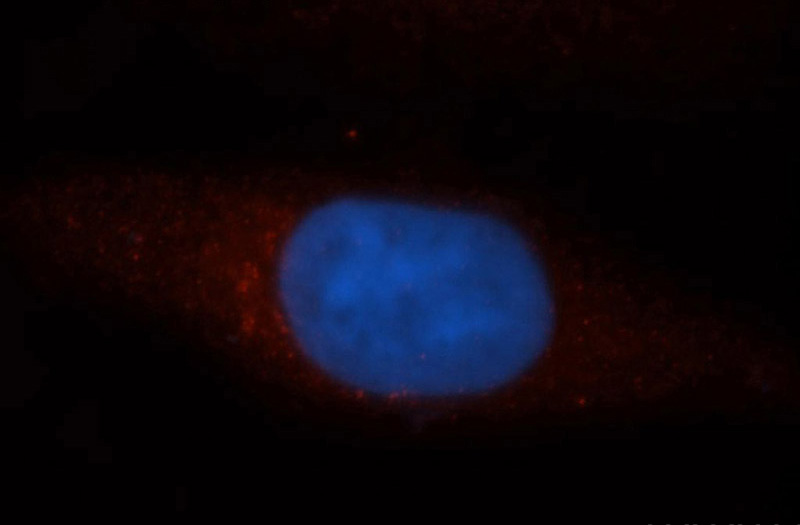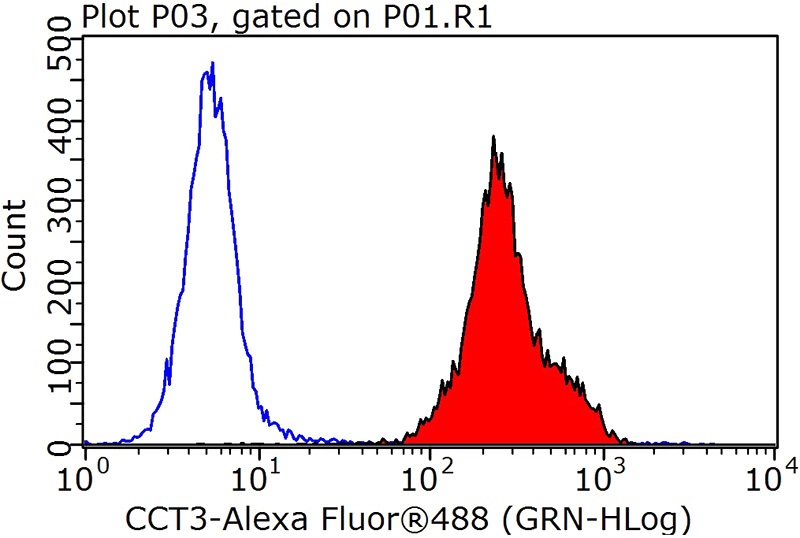-
Product Name
CCT3 antibody
- Documents
-
Description
CCT3 Rabbit Polyclonal antibody. Positive IHC detected in human colon cancer tissue, human liver cancer tissue. Positive IF detected in HepG2 cells. Positive FC detected in HepG2 cells. Positive IP detected in mouse brain tissue. Positive WB detected in mouse brain tissue, HeLa cells, human spleen tissue, mouse kidney tissue, rat kidney tissue. Observed molecular weight by Western-blot: 60 kDa
-
Tested applications
ELISA, WB, IHC, IF, FC, IP
-
Species reactivity
Human, Mouse, Rat; other species not tested.
-
Alternative names
CCT gamma antibody; CCT3 antibody; TCP 1 gamma antibody
-
Isotype
Rabbit IgG
-
Preparation
This antibody was obtained by immunization of CCT3 recombinant protein (Accession Number: NM_005998). Purification method: Antigen affinity purified.
-
Clonality
Polyclonal
-
Formulation
PBS with 0.1% sodium azide and 50% glycerol pH 7.3.
-
Storage instructions
Store at -20℃. DO NOT ALIQUOT
-
Applications
Recommended Dilution:
WB: 1:500-1:5000
IP: 1:500-1:5000
IHC: 1:20-1:200
IF: 1:20-1:200
-
Validations

mouse brain tissue were subjected to SDS PAGE followed by western blot with Catalog No:109082(CCT3 antibody) at dilution of 1:1000

Immunohistochemical of paraffin-embedded human colon cancer using Catalog No:109082(CCT3 antibody) at dilution of 1:50 (under 10x lens)

Immunofluorescent analysis of HepG2 cells, using CCT3 antibody Catalog No:109082 at 1:50 dilution and Rhodamine-labeled goat anti-rabbit IgG (red). Blue pseudocolor = DAPI (fluorescent DNA dye).

IP Result of anti-CCT3 (IP:Catalog No:109082, 3ug; Detection:Catalog No:109082 1:1000) with mouse brain tissue lysate 3600ug.

1X10^6 HepG2 cells were stained with 0.2ug CCT3 antibody (Catalog No:109082, red) and control antibody (blue). Fixed with 90% MeOH blocked with 3% BSA (30 min). Alexa Fluor 488-congugated AffiniPure Goat Anti-Rabbit IgG(H+L) with dilution 1:1000.
-
Background
CCT3 represents chaperonin containing TCP1, subunit 3 (gamma)
-
References
- Seo S, Baye LM, Schulz NP. BBS6, BBS10, and BBS12 form a complex with CCT/TRiC family chaperonins and mediate BBSome assembly. Proceedings of the National Academy of Sciences of the United States of America. 107(4):1488-93. 2010.
- Yamabe K, Maeda H, Kokeguchi S. Antigenic group II chaperonin in Methanobrevibacter oralis may cross-react with human chaperonin CCT. Molecular oral microbiology. 25(2):112-22. 2010.
- Yu Y, Shen H, Yu H. Systematic proteomic analysis of human hepotacellular carcinoma cells reveals molecular pathways and networks involved in metastasis. Molecular bioSystems. 7(6):1908-16. 2011.
- Redgrove KA, Anderson AL, Dun MD. Involvement of multimeric protein complexes in mediating the capacitation-dependent binding of human spermatozoa to homologous zonae pellucidae. Developmental biology. 356(2):460-74. 2011.
- Hirai K, Maeda H, Omori K, Yamamoto T, Kokeguchi S, Takashiba S. Serum antibody response to group II chaperonin from Methanobrevibacter oralis and human chaperonin CCT. Pathogens and disease. 68(1):12-9. 2013.
- Tarkar A, Loges NT, Slagle CE. DYX1C1 is required for axonemal dynein assembly and ciliary motility. Nature genetics. 45(9):995-1003. 2013.
Related Products / Services
Please note: All products are "FOR RESEARCH USE ONLY AND ARE NOT INTENDED FOR DIAGNOSTIC OR THERAPEUTIC USE"
